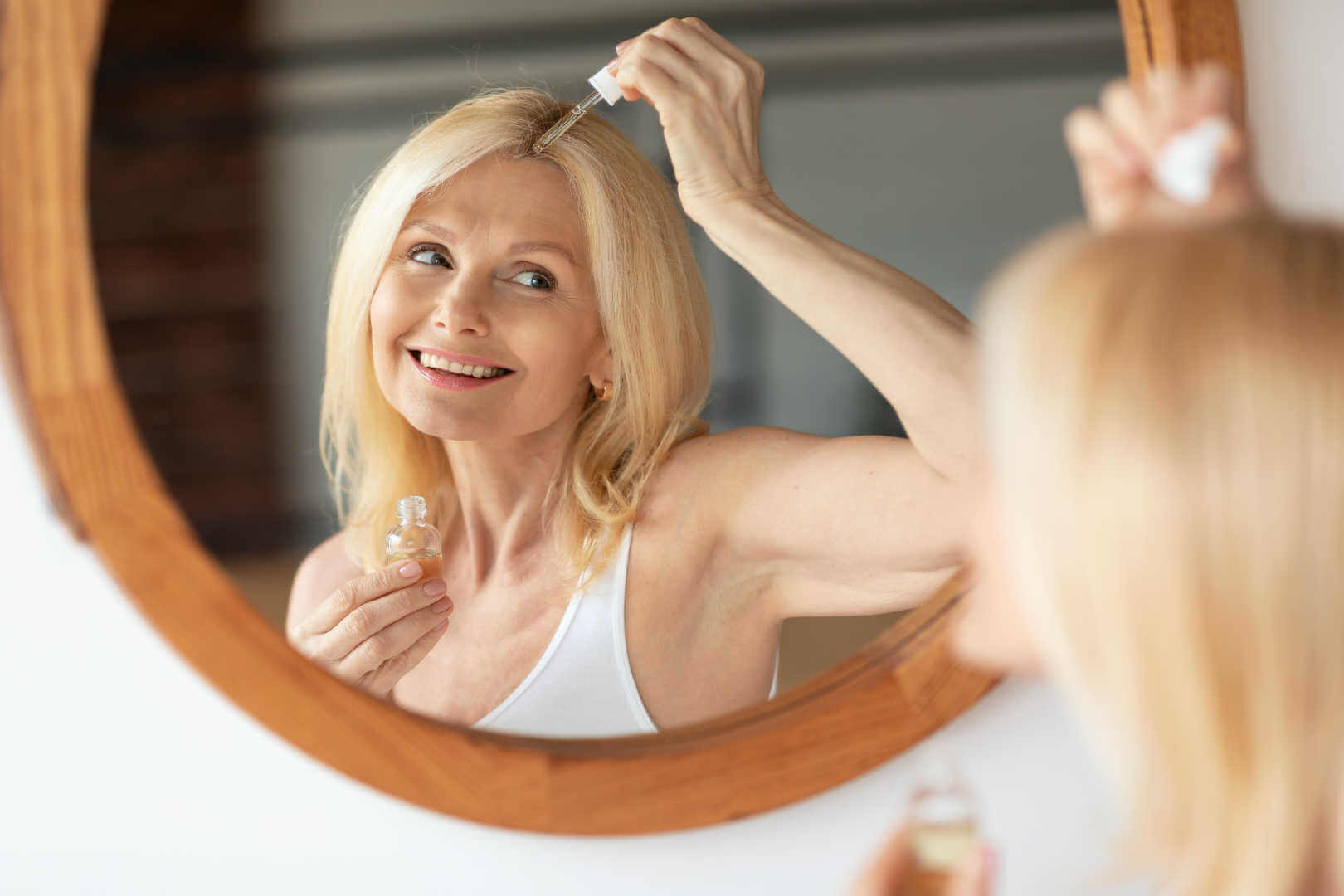Understanding Menopausal Hair Changes
Before diving into nutritional strategies, let’s first understand the factors that contribute to hair changes during menopause.
1. Hormonal Fluctuations
Menopause involves a significant decline in estrogen and progesterone, two hormones that play a vital role in hair health. These hormonal fluctuations can lead to changes in the hair growth cycle:
- Thinning Hair: Reduced estrogen levels can cause hair follicles to spend more time in the resting phase, resulting in thinner hair.
- Dryness and Brittle Hair: Lower estrogen levels can lead to reduced sebum production, making the hair dry and prone to breakage.
- Hair Loss: Some women may experience noticeable hair loss during menopause, influenced by genetics and hormonal changes.
2. Age-Related Factors
Apart from hormonal changes, age-related factors can also affect hair health. As we age, hair growth naturally slows down, and hair strands may become finer and more delicate.
The Role of Nutrition in Menopausal Hair Health
Nutrition plays a pivotal role in maintaining healthy hair, and its importance becomes even more apparent during menopause. Here’s how specific nutrients can support your hair during this transformative phase:
1. Protein
Hair is primarily made of a protein called keratin. Consuming an adequate amount of protein is essential for healthy hair growth. Include lean sources of protein in your diet, such as poultry, fish, beans, and legumes.
2. Biotin
Biotin, a B-vitamin, is often referred to as “the hair vitamin.” It plays a crucial role in hair health and may help prevent hair thinning and loss. Foods rich in biotin include eggs, nuts, seeds, and sweet potatoes.
3. Iron
Iron deficiency can lead to hair loss, so it’s essential to maintain sufficient iron levels. Incorporate iron-rich foods like lean red meat, poultry, fish, beans, and fortified cereals into your diet.
4. Omega-3 Fatty Acids
Omega-3 fatty acids found in fatty fish, walnuts, and flaxseeds can promote scalp health, reduce inflammation, and improve hair quality.
5. Vitamins
- Vitamin D: Adequate vitamin D levels are associated with healthy hair follicles. Get your vitamin D from sunlight exposure and foods like fatty fish and fortified dairy products.
- Vitamin A: Vitamin A supports the production of sebum, the scalp’s natural oil. Include foods like sweet potatoes, carrots, and spinach in your diet.
- Vitamin C: This antioxidant vitamin helps with collagen production, which is essential for hair structure. Enjoy citrus fruits, strawberries, and bell peppers for your vitamin C intake.
6. Zinc
Zinc deficiency has been linked to hair loss. Ensure you’re consuming zinc-rich foods like lean meats, poultry, nuts, and seeds.
7. Collagen
Collagen is a structural protein that can enhance hair’s strength and appearance. Bone broth, fish, and collagen supplements are good sources.
Practical Tips for Nutritional Support
Incorporating the right nutrients into your diet is crucial for menopausal hair health. Here are some practical tips to ensure you’re getting the nutrition your hair needs:
1. Balanced Diet
Aim for a well-rounded diet that includes a variety of nutrient-rich foods. Incorporate lean proteins, fruits, vegetables, whole grains, and healthy fats into your meals.
2. Supplements
If you struggle to meet your nutrient needs through diet alone, consider supplements. Consult with a healthcare provider before starting any supplements to ensure they are appropriate for you.
3. Hydration
Stay well-hydrated to support overall bodily functions, including hair growth.
4. Limit Sugar and Processed Foods
Excess sugar and processed foods can lead to inflammation, which may negatively impact hair health. Limit your consumption of sugary and highly processed items.
5. Scalp Health
A healthy scalp is essential for healthy hair. Practice good scalp hygiene and consider using gentle exfoliating products to remove dead skin cells.
6. Hair Care Routine
Choose hair care products suitable for your hair type and avoid excessive heat styling, which can damage hair.
7. Stress Management
Stress can exacerbate hair problems. Engage in stress-reduction techniques like meditation, yoga, or deep breathing exercises.
Conclusion
Menopause can bring about significant changes in hair health, including thinning, dryness, and hair loss. However, with proper nutrition and a balanced diet rich in essential nutrients, you can support your hair and maintain its vibrancy during this transformative phase. Remember that individual experiences may vary, so it’s essential to consult with a healthcare provider or a registered dietitian for personalized guidance on managing menopausal hair changes through nutrition.
References:
-
-
- American Academy of Dermatology Association. (n.d.). Hair loss: Who gets and causes. https://www.aad.org/public/diseases/hair-loss/causes/women
- Mayo Clinic. (2021). Menopause. https://www.mayoclinic.org/diseases-conditions/menopause/symptoms-causes/syc-20353397
- National Institutes of Health. (2021). Biotin fact sheet for consumers. https://ods.od.nih.gov/factsheets/Biotin-Consumer/
- National Institutes of Health. (2021). Iron fact sheet for consumers. https://ods.od.nih.gov/factsheets/Iron-Consumer/
-
Related Articles
September 12, 2023
Scalp Care Essentials during Menopause: Nurturing Your Hair’s Foundation
Menopause is a transformative phase in a woman's life, marked by hormonal…
September 12, 2023
Adapting to Hair Texture Changes During Menopause: Tips and Strategies
Menopause is a natural phase of a woman's life, signaling the end of the…
September 10, 2023
Hormone Replacement Therapy and Hair Health: A Comprehensive Guide
Hormone Replacement Therapy (HRT) has long been a topic of discussion among…




